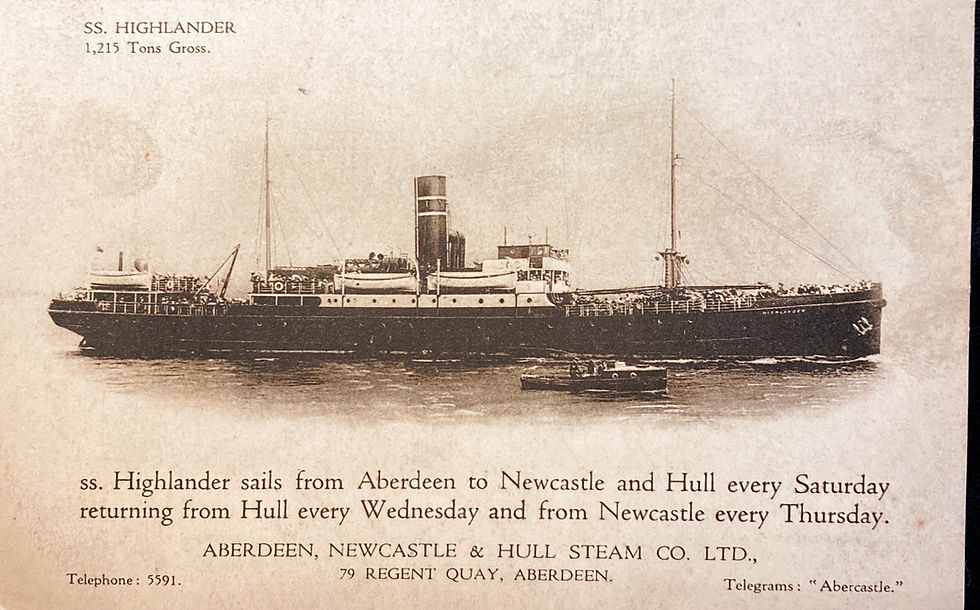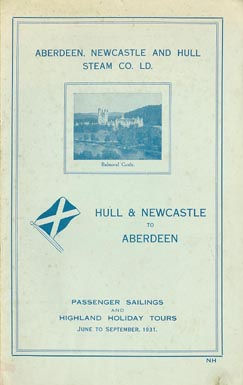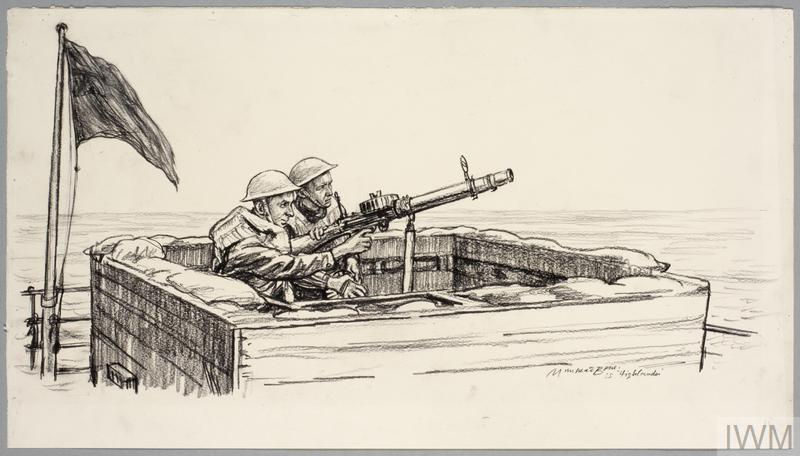
I recently found a postcard showing a photo of a small ship amongst a box of memorabilia I inherited from my Great Grandmother. What was this picture doing amongst all of the family photographs? Why had it been kept for so many years? Intrigued, I decided to look into the story of the ship, the SS Highlander, and found out that a popular coastal passenger steamer ended up being the first merchantman to shoot down an enemy aircraft during the Battle of Britain.
In the Autumn of 1920, the 1,215-ton Coastal Steamer Highlander began sailing each week from Aberdeen to Hull to Newcastle Upon Tyne and back carrying fare paying passengers, goods and livestock.
She was apparently a popular sight on Newcastle Quayside each Sunday morning when she returned from Aberdeen. Crowds would gather before the Sunday market to see her arrive at her berth opposite Broad Chare and unload her cargo of ponies and sheep. The gangway used for unloading was brought along from the Swing Bridge and the Dockers were assisted by large numbers of enthusiastic local children.

During the summer she also undertook pleasure cruises to places like Scarborough and the Scottish Highlands.
I suspect that my family obtained the postcard during this period. Perhaps as a treasured memento of a rare holiday trip to Scotland or Hull.
Passenger trade began to tail off in the 1930’s and at the outbreak of WW2 in September 1939 the passenger service was suspended. The Highlander was laid up at the buoys in Aberdeen Harbour and was sold soon afterwards to the North of Scotland, Orkney and Shetland Company.
During the Battle of Britain, the Highlander was the first merchantman to bring down a German aircraft with its Lewis machine-gun; this on the night of 2nd August 1940. She was sailing from Aberdeen to Lerwick at the time. An account of the attack was published in the London Gazette (06.08.1940):
‘Towards midnight SS Highlander was attached by enemy aircraft. The night was clear and starry, but there was no moon. The aircraft came up and opened fire with machine guns, and turned to attack again from ahead, passing down the port side. The enemy were engaged with defensive armament. As the first aircraft flew down the port side from ahead, ‘Highlanders’ fire caused his port wing to hit a lifeboat and he crashed onto the poop. His fuselage fell into the sea and ‘Highlander’ went on her way. The second attack was made about 10 minutes later, the same tactics being used. This time the enemy was hit and seen to fall into the sea a hundred yards astern’
German records show that the two Heinkel bombers failed to return to base and both crews were reported as missing. English records confirm that, sadly, both crews died during the raid.
Two of the Highlander’s crew were injured when they put out the fire, but the ship suffered only minor damage and sailed triumphantly into Leith Harbour with the wrecked Heinkel still lodged on its deck. Anderson, who had manned the Lewis gun realised he had a bullet dent in his steel helmet and a bullet scar across his upper lip.

George Anderson: Able Seaman, awarded the MBE and
Lawrence Smith Halcrow, Steward, Commended (image: Imperial War Museum)

The following awards were given for meritorious service:
OBE: Captain William Gifford, Master SS Highlander
MBE: George Anderson, Able Seaman; Bert Whyman, Fireman
Commended: Lawrence Smith Halcrow, Steward; Miss Cockburn, Stewardess; William Birnie, Able Seaman.
Captain William Gifford, Master, SS Highlander
(Image: Imperial War Museum)
The owners must have been afraid of German reprisals, though, as the Highlander was quickly re-named St. Catherine. Tragically she was sunk only three months later on 14th November 1940 when sailing from Aberdeen to Kirkwall with a general cargo. She was hit by an aerial torpedo off Aberdeen and went down with all hands. Among them was George Anderson who had manned the Lewis gun in the earlier attack.
Sources:
'Battle for the Channel: The First Month of the Battle of Britain 10 July – 10 August 1940' by Brian Cull.
Battle of Britain Historical Society www.battleofbritain1940.net
Chronicle Live 31.03.2010
London Gazette 6.8.1940

Commenti